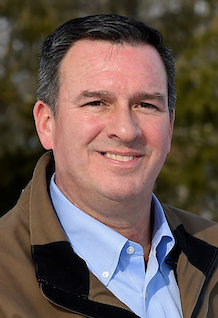State Senator Michelle Hinchey announces she’ll seek re-election, faces challenge by Amedure
ALBANY COUNTY — This year’s State Senate 46th District election has taken shape, and it’s one that will be familiar to voters.
State Senator Michelle Hinchey, a Democrat, announced last week that she’s seeking re-election, canceling out an earlier announcement made by her team that she was considering a run for federal office.
This follows an announcement made in March by Richard Amedure, Hinchey’s 2020 opponent who ran on the GOP line, that he was taking another shot at the office.
Hinchey briefly considered running for Congressman Antonio Delgado’s seat following his selection as lieutenant governor. Delgado, a Democrat, represents New York’s 19th Congressional District, which covers a large portion of the Hudson Valley and beyond, and which has alternated between Democratic and Republican representation a number of times since the 1990s.
But in a series of tweets on Friday, Hinchey highlighted the revitalized fight for abortion rights following the revelation that Roe v. Wade may soon be overturned as one of the reasons she’s deciding to remain in the state arena.
Roe v. Wade is the 1973 Supreme Court case that guaranteed federal constitutional protections for abortion rights. The court’s draft majority opinion on a pending abortion case, which was leaked, revealed Roe would likely be overturned and, with it, federal abortion protection.
In her tweets, Hinchey wrote that given “the impending & detrimental Supreme Court decision to overturn a person’s right to choose, it’s never been more clear that state governments are where the work is most important. With our federal government in turmoil, states are now the active battlegrounds in our fight to protect our democracy & to ensure equitable & just policies that protect all of us.”
Hinchey wrote that, “For the strength of our party & the future we need here in NYS, I have decided to stay in the Senate & run for re-election … I look forward to continuing the fight for our community, our state, and our democracy together.”
In 2020, Hinchey had beaten Amedure by 2,625 votes out of roughly 150,000 cast. She had outraised him in individual contributions, putting her $811,000 against his $173,000, approximately.
The 2022 election will introduce the newly redrawn legislative districts. The state legislature had approved a set of maps that would have given the district a new designation — District 48 — and changed the boundaries. However, those maps were thrown out after an appellate court determined that they too heavily favored Democrats, despite the legislature’s attempts to put together an independent redistricting commission to avoid such accusations.
The court appointed a special master to draw up new maps, which have yet to be released. The state primary is expected to be held on Aug. 23 on the current timeline.
The Enterprise spoke with both Hinchey and Amedure to find out where they stand in 2022.
Amedure
Having lost by less than 3,000 votes in 2020, Richard Amedure thinks his odds of success are good this time around.
He told The Enterprise in March that because no-excuse voting — which had temporarily allowed voters to mail in their ballots because of the dangers posed by the coronavirus pandemic — was rejected by New Yorkers as a long-term implement, Hinchey won’t benefit from what many Republicans have suggested was a rigged system favoring Democrats.
Two years ago, Democrats were more likely than Republicans to vote by mail, and the ability to vote by mail increased turnout. Those two factors led to Amedure and several other Republicans waking up after Election Day to very favorable numbers, only to have their leads reversed after mail-in ballots were counted. Before mail-in ballots, Amedure was up, over Hinchey, by roughly 8,000 votes.
“There was a lot of extra voting going on,” Amedure told The Enterprise this week. “But now it’s going to be, come out on Election Day or do early voting, or you’ll have to have an excuse of being out of town to vote absentee.”
Hinchey has her own favorable conditions going in as well. For one, she’s now an incumbent Democrat in a district that became more Democratic since its inception in 2010. She’s the chair of the agricultural committee, which, in theory, might endear her to rural voters, who tend to lean Republican.
Amedure called Hinchey’s committee work a “travesty,” and pointed to certain policies — such as requiring union workers on marijuana farms and reducing the overtime labor threshold for farm workers — as what he sees as evidence that her influence in that area is not benefitting actual farmers.
“There’s a lot of upset people out there …,” Amedure said, focusing on the union-labor aspect. “In New York, I hire kids to help me out around the farm. If I have to hire union kids, there’s no profit margin there. I just do it to get some help, and they’re going to require union labor.”
Of farms that require workers to put in significant overtime to keep up with the work that needs to be done, Amedure said, “That’s just the way it is.”
When asked about his concerns going into the race, Amedure hit many of the same points he was asked about during an interview with The Enterprise ahead of the 2020 election. He’s still upset about bail-reform laws, and says that voters can look to their televisions to see the problems he thinks it’s causing.
He also thinks the state government is overspending, pointing to the federal injections into the state budget that arose largely out of the coronavirus pandemic as well as debt figures.
“[Democrats] are out there spending, creating new programs and all this stuff,” Amedure said. “We’re spending our children’s children’s money now.”
Last week, when asked about his view on state-level abortion rights, Amedure said through his spokesperson that he does not think the Supreme Court decision has much bearing on New Yorkers’ lives given the current state laws and that local representatives would do well to put their minds toward other issues.
“New York’s abortion laws predate the Roe decison and were further expanded and codified in 2019 by the state Legislature,” Amedure said. “Any potential decision from the Supreme Court will have no impact on the laws here in New York.
However, the Demoratic governor said this week she supports amending New York’s state constitution not just to preserve abortion rights but to preserve other civil rights as well.
“Albany politicians should be focused on solving the problems they have created,”
Amedure went on. “New Yorkers deserve real solutions to the increased violence in our communities, unaffordable costs on everything from gas to groceries, and the lack of access to quality education for children across New York.”
Hinchey
Michelle Hinchey wants to continue the work she’s put in for the last 16 months in office and keep fighting for her constituents on “the front-line of policy,” which is how she described the state’s legislative role to The Enterprise this week.
“We have to be making sure that the policy and the laws that we are crafting here in New York work for all of us, especially our upstate communities,” she said. “I felt like, and I do feel, that I can make the biggest difference and have the biggest impact … by staying and running for re-election and by being at the state level.”
Hinchey said that she’s had over 30 bills signed into law since her election, putting her alongside her colleague Senator Neil Breslin, a Democrat representing the 44th District, for most bills passed in the Senate.
“And all of those bills are geared toward issues that impact upstate,” she said, describing one that cuts the cost for broadband providers to develop their infrastructure, one that established a rural ambulance services task force, and one that aims to expand the adoption of sustainable and resilient soil practices.
Hinchey also pointed to her work in expanding early childhood education by creating over 300 new, full-day slots for 4-year-olds in the region, including Guilderland.
“Every child deserves a quality education, [and] that also allows and helps people to get back to work,” she said.
She added that, as chair of the Senate Agriculture Committee, she had been instrumental in the state’s creation of a budget that holds more than $52 million in agriculture appropriations — the most money the state has spent in that area in recent history.
She said those funds will expand the investment tax credit from 4 percent to 20 percent, which allows new farmers to acquire capital more easily; double the workforce retention tax credit from $600 to $1,200 per employee through 2026; and establish a $5 million meat processing expansion grant program, among other things.
“That’s critical for upstate communities and upstate rural development … ” Hinchey said, adding that she’s been turning agriculture from an issue that wasn’t “top of mind” for her colleagues in non-rural areas “into a space that people really want to help.”
“They’re paying attention to food access and our local family farms, and that’s something I’m incredibly proud of and something that we’ll continue to keep fighting for,” she said.
Hinchey, who’s from Saugerties, rejected Amedure’s assertion about her appointment as chair of the agriculture committee, arguing that the upstate community is the one “that had raised her,” and that her championing of farmers’ interests is evident from the work she had described.
“I requested that committee,” she said. “I sought it out and I lobbied our leadership for me to be the agriculture chair because that is my community.”
Hinchey said that she’s currently working on two bills that influence the way food is purchased by state agencies, “but the one that I’m really excited about is setting the first-ever procurement goals for state agencies so that by 2024, twenty-five percent of all food purchased by state agencies is local food produced here in New York by New York farms.”
Hinchey also talked about a bill in the works that would make it so that utility bills show the money that is owed as opposed to an estimate; estimates, she said, are “dramatically hurting people.”
There’s also a bill that would help jumpstart the industrial hemp industry following the state’s legalization of marijuana last year, which Hinchey said would be a boon for farmers.
As for abortion rights, Hinchey said that the all-but-inevitable slashing of Roe v. Wade demonstrates that “laws are in place until they’re not,” and that there’s more work to be done on the state level to ensure that residents have adequate healthcare services.
“While abortion is legal here in New York and while choice will always be protected, not everybody — especially those living in upstate communities — has the access they need,” she said.
Hinchey is the sponsor of a bill that would require hospitals and the state’s Department of Health to list what services are excluded by hospital policy.
“The cost of healthcare continues to skyrocket and our smaller hospitals are unable to stay in business because of the cost,” she said. “So we’re seeing mergers and takeovers by larger, often religiously-affiliated hospitals, and what that means is there could be care in a community one day and, after that merger, that care, specifically reproductive care, but also end-of-life care and gender-affirming care, may be gone based on that hospital consolidation or merger.”




